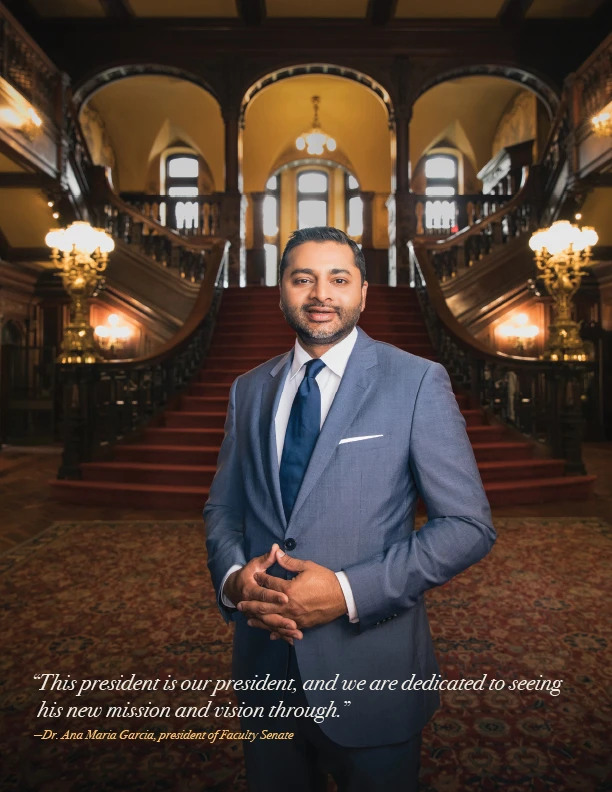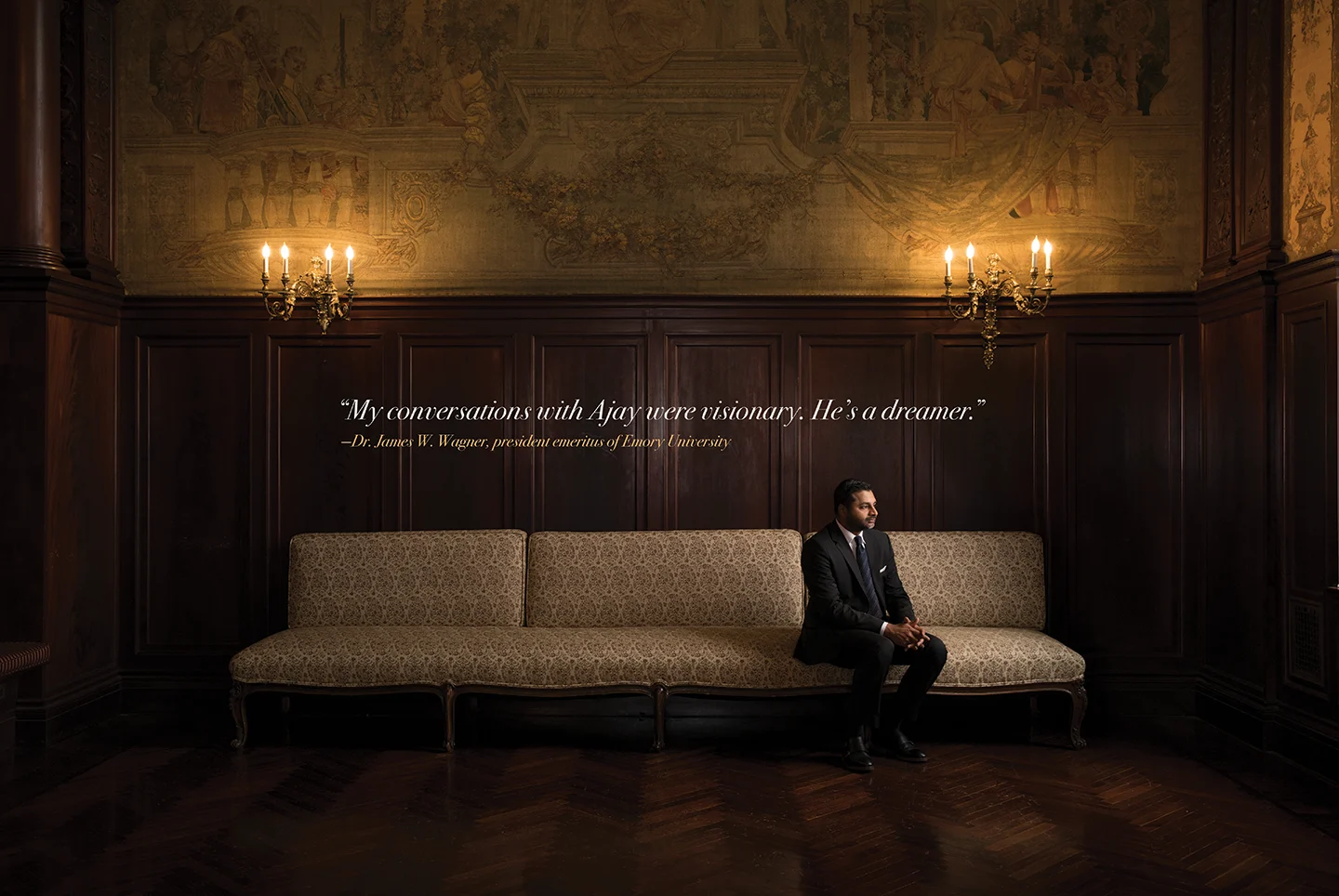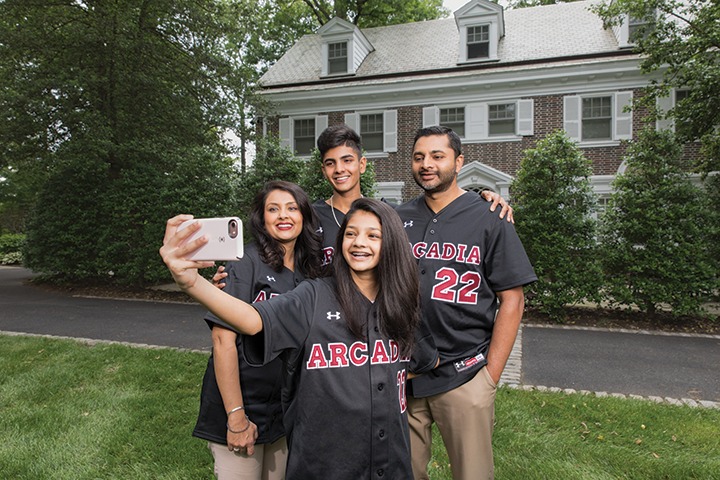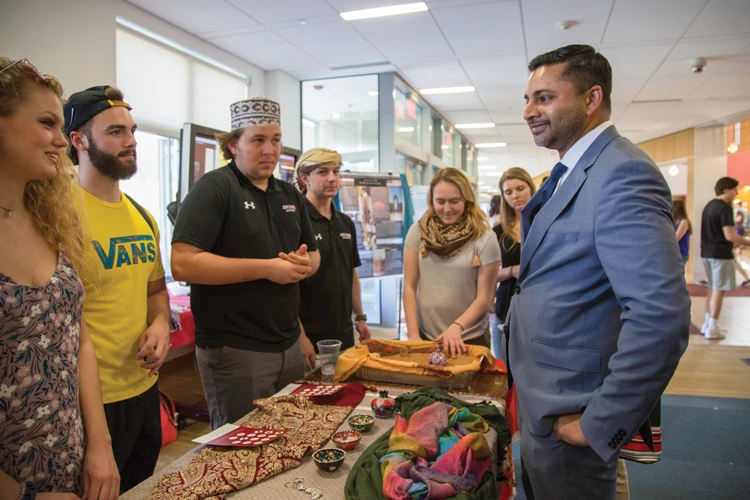A President for the Future
On a cloudy, April afternoon, more than 200 Arcadia students gathered onto Haber Green. The boisterous group carried signs that urged “AU Turn on the Light”— a protest over a plan to reduce the size of the faculty at Arcadia and a call for more transparency.
Several students took to the microphone and shared personal stories of the impact faculty members had made on them. “Say it loud. Say it clear. We want our professors here,” the crowd chanted.
April 2 also happened to be the first day of work for the University’s 22nd President, Dr. Ajay Nair. Some leaders might have kept to the confines of the administration building until the demonstration dissipated.
Not Dr. Nair.
The 44-year-old, who has built a reputation as student-centric, most recently as senior vice president and dean of campus life at Emory University in Atlanta, left his office in historic Grey Towers Castle and walked into the middle of the demonstration—to listen.
Caitlin Joyce ’20 was one of those who noticed. “Anybody else who was president and saw a huge protest on their first day probably would have been a little freaked out,” says the 20-year-old Sociology and Anthropology double major from Cape May, N.J. “I appreciated the fact that he showed up and genuinely was interested in listening to students. It was a testament to the fact that he’s the kind of person to not shy away from a challenge, but face it head on.”
Indeed.
Students offered him hugs, and when they expressed surprise at his presence, Dr. Nair asked, “‘Why are you surprised? You shouldn’t be. It’s our community.’ They said that wouldn’t have happened in the past. I said, ‘Get used to it.’”
A few days earlier, Dr. Nair (rhymes with tire) had halted any personnel decisions. “I felt strongly that if I was going to inherit such an important decision, then I should own it,” he says during an interview in his office. “In order to own it, I need to fully understand the process. So I’m engaging the community.”
He really is the whole package. He is a president for the future.
– Dr. Joycellen “Jey” Auritt ’71, vice chair of Arcadia’s Board of Trustees and chair of the Presidential Search Committee
That day, Dr. Nair also canceled a welcome reception in his honor and instead accepted an invitation to a hot-seat meeting with faculty. “It was very tense,” says Dr. Ana Maria Garcia, Faculty Senate president and associate professor of Sociology, Anthropology, and Criminal Justice.
Dr. Nair’s decision to hear them out, however, eased the mood. “There were all these ideas,” she says. “Should we demonstrate at graduation? Do we say something public? Do we disrupt honors events? His listening made faculty and staff and students say: ‘We don’t have to do this. We know he’ll work with us.’”
Since then, discussions that include students, faculty, and other constituencies have already taken place. At the May Board of Trustees meeting, a statement of support from the Faculty Senate was read into the minutes. The message, Dr. Garcia says, was clear: “This president is our president, and we are dedicated to seeing his new mission and vision through.”
Dr. Nair, by many measures, could be considered the 2.0 President, a branding he embraces.
The Gen Xer—nearly twenty years younger than the average age of 62 for a college president—is social media savvy, of course. “I’m an open book,” he says with a smile. “Spend an hour on Facebook. My whole life is there.”
 Photo by Colin Lenton
Photo by Colin LentonDr. Nair recently posted a picture of himself (with much longer hair) and his future wife, Paayal, from their undergraduate days at Pennsylvania State University. He uses the handle @PrezNair on Facebook, Twitter, and Instagram and frequently Snapchats Arcadia and personal events. Many students and faculty communicate with him via instant messaging rather than email.
But his 2.0 credentials represent more than posting, tweeting, and snapping skills. Dr. Nair has made clear he aspires to be a different kind of president.
“You can be a university president who presents in a substantive, authentic way,” he says. “I don’t have to shed who I am to fit into a role.”
On this day, Dr. Nair wears a well-cut navy suit and crisp white shirt with cufflinks and a blue tie. His jacket sports an Arcadia lapel pin. Dr. Nair exudes confidence and a certain charisma that includes an easy laugh and touches of humor, a combination that easily wins over a room.
At this year’s undergraduate Commencement, the co-editor of the 2008 Desi Rap: Hip Hop and South Asian America could not resist a short rap, offering his take on Kanye West from the podium to the cheers of the Class of 2018: “Gotta testify, come up in the spot lookin’ extra fly, ’fore the day I die, I’mma touch the sky.”
Throughout his career, Dr. Nair also has taken on controversial issues, including race relations. When Emory students made certain demands, he oversaw a deep-dive response that included a racial-justice retreat for students and faculty. Earlier this year [2018], he received the Dr. Doris Michiko Ching Shattering the Glass Ceiling award from NASPA, an association for student affairs professionals, that recognized his consistent challenging of the status quo and empowering of students.
As an Indian American, Dr. Nair is Arcadia’s first president of color and one of a dozen or so to reach that peak of higher education in the United States, along with being one of the first American-born college presidents of Indian heritage. The American Council on Education’s 2017 study of college presidents found that 2 percent were Asian or Asian American in the previous year—a percentage that has doubled over a decade.

His experiences growing up as the child of immigrants, as a Hindu and Malayalee (people originating from the state of Kerala)—that is, as an “other”—in predominately white Broomall, a suburb in Delaware County, helped shape his views on social issues and make him a thought leader unafraid to voice controversial opinions, he says.
Emory Trustee Emeritus Laura J. Hardman, who chaired the campus life committee that hired Dr. Nair there, says his background “certainly makes him open to differences in others, different perspectives, different cultures.”
At Emory, he spearheaded the $100 million Campus Life Center, to be completed next year. Many call the building his legacy. Notice its name. It’s purposely not called a student center. Rather, Hardman says it represents “his viewpoint of inclusiveness, of looking at campus life as the heart of the university.”
Adds newly appointed Arcadia trustee Dr. James W. Wagner, president emeritus of Emory and Dr. Nair’s mentor: “That’s significant. He imagined this being a life center for a number of purposes, including but beyond student services. My conversations with Ajay were visionary. He’s a dreamer.”
Dr. Nair is known for bringing disparate stakeholders together to build trust. “He’s a master at that,” Dr. Wagner says. “You have presidents who are the professors’ president, or students’ president, or board’s president. Ajay’s demonstrated he’s able to be all of those things.”
Dr. Nair, himself, talks about next-gen college leaders making “principled and ethical decisions” and “cultivating community to come to better decisions.”
As the baby-boom generation retires from higher-ed leadership, Dr. Nair says there is a unique opportunity to find new voices with the qualities he has outlined. “I’m not suggesting I’ve got it all figured out, or that I am the 2.0, the model,” he says. “Not at all. I think I have certain characteristics that define 2.0.”
At Arcadia, many have been on full display since Day One.
After meeting with students, faculty, and staff leadership groups, a campuswide working-session was held on April 20, where participants addressed issues including budget, communications, transparency, shared governance, and Arcadia’s aspirational vision. From this meeting, committees were formed to address these issues.
“He’s inspired us,” says Dr. Garcia. “He gives us an opportunity to do something radical. We can find that potential, drive the narrative of who we are rather than responding to the market.”
Such optimism is central to Dr. Nair’s philosophy. He notes that Arcadia’s situation is typical of many smaller, liberal arts schools.
“For the past two years, maybe longer, Arcadia has been in survival mode,” he says. “The question is, what are we going to do to position ourselves for success? I want Arcadia to get it so right that we become a leader within the higher-education landscape. In other words, we’re not just following best practices; we’re creating them. That to me would be success.” To that end, Dr. Nair has called for an ambitious, five-year strategic plan—he calls it “a five-year aspiration”—that sets priorities.
“That’s what’s really been missing,” he says, “a plan that brings all of these stakeholders together and points us in the direction of a shared agenda. It may be the single most important thing I’m going to do, because that will be the building block for everything else.”
Dr. Joycellen “Jey” Auritt ’71, vice chair of Arcadia’s Board of Trustees and chair of the Presidential Search Committee, points out that Dr. Nair was not a traditional candidate for president, given his student affairs background. Yet, he stood out in the University’s formal, international search.
When he spoke at Arcadia, “there was a sense of electricity in the room that I’ve only seen once before—when President Obama came to campus,” she says. “The faculty were pumped. He generated a vision, even though he did not have it fully laid out, and he made it very clear he was going to work with the community to develop it.”
Dr. Auritt also praised his energy, social justice bent that aligns with Arcadia’s mission, and sense of humor. (He showed pictures of his children in Arcadia T-shirts.) Finally, he had local roots. But, she says, no single trait won him the job.
“He really is the whole package,” Dr. Auritt says, one that shouts “not business as usual. I think we’ve turned a corner. He is a president for the future.”
Dr. Nair never expected to make a career in higher education.
His mother, Radha, was trained as a nurse and immigrated to Dubai in the late sixties as a stepping-stone to the United States and a better life. She left behind in India her husband, Thankappan, and first-born son, Anil, until they could join her. By the early seventies, the family was settled in Philadelphia, and Ajay was born.
“My mother was bold and courageous,” he says. (She died when Nair was 10 years old.) “She sought opportunity.”
Even though his parents—his father recently retired from a procurement position at the Children’s Hospital of Philadelphia—did not have four-year college degrees, education was valued. So was culture. Dr. Nair is fluent in his parents’ native Malayalam and spent summers as a child in India, making the lengthy journey alone at 8 years old.
“He was a confident kid,” says older brother Anil, 51, a director at Deutsche Bank in New York City. Sports, he adds, taught Dr. Nair the basics of leadership and teamwork and played to his goal orientation.
Ajay also “marched to his own beat”—and that includes hip hop.
“If I had a video of when he did break dancing,” Anil says, gleefully, “I’d give it to you. He likes to do things that might be a risk.”
After graduating from Marple Newtown Senior High School, Dr. Nair went to Penn State and studied human development and family studies with no particular job in mind. Meanwhile, he was making a name as a student activist.
He’s able to make you realize there is more out there that you can achieve.
– Paayal Nair
It was the nineties, the period of the O.J. Simpson trial, the Los Angeles riots, and debate over affirmative action policies. Dr. Nair became president of the Asian American Student Coalition and spoke out on campus tensions.
At one event, Dr. Nair says he was “offering my propaganda at the front of the room.” In the audience was Paayal, then a freshman from Pittsburgh. The story goes that she turned to her friend and said, “I’m going to marry that guy some day,” which she said was out of character for her.
She was impressed by his charisma but also by his passion, Paayal says. “When things are not right, you see how hard he works,” says the 41-year-old school psychologist. “He was motivating the crowd. He was willing to invest whatever he needed to in order to make that cause move forward.”

They married in 2000 and have two children, Krishna, 16, and Rani, 13. Over the years, his wife says she has found that one of his best qualities is making those around him better. “He’s able to take who you are and make you realize there is so much more out there that you can actually achieve,” she says. “I feel like he does that for me, his own kids, the students he interacts with, and even the staff and faculty.”
Through his activism, Dr. Nair says he realized that certain college administrators cared about the same issues he did—and that he might find a place in higher education. “They’d sit me down and whisper, ‘Did you know the administration is trying to do this?’” he says. “I wanted to be that person who would call the students into the room and not whisper but say, ‘How are we going to do this together? How are we going to make this community stronger and feel empowered?’”
First, though, a professor encouraged the 1995 graduate to teach English as a Second Language—in rural South Korea. The stint, he says, shaped him. “I’d be on a bus, and people would come up to me and touch my hair,” he says. “I had always been ‘othered’ in the U.S., but this was in a more profound way. It really shook me to the core and helped me become comfortable in my own skin.”
Back in the States, Dr. Nair continued to take on new roles, usually at the behest of a colleague or mentor who saw some quality in him that would make him perfect for the post.
He started in admissions at his alma mater, but quickly realized he wanted to influence not just who had access but the whole college community. After a doctorate (2002) from Penn State’s College of Education, Dr. Nair spent the next decade quickly moving up, first as an assistant dean of students at the University of Virginia, then as associate director of the Asian American Studies Program and director of the Pan-Asian American Community House at the University of Pennsylvania and as associate dean of student affairs at Columbia University before returning to Penn as senior associate vice provost for student affairs. At Penn, he also taught courses and pursued his scholarship in ethnic studies. “I wrote and wrote and just loved it,” he says.
When Emory came calling, he initially said no thanks. But Dr. Wagner, then Emory’s president, made a proposition Dr. Nair could not refuse. “He said, ‘Imagine your dreams and being able to achieve everything you ever wanted.’ That was the first time anybody had said, ‘Dream it up, and go do it.’”
Now, Dr. Nair wants to dream it up at Arcadia.
It’s easy to get to know him. We’re Facebook friends.
– Baaqeyah Amala Muhammad El ’19
Baaqeyah Amala Muhammad El ’19, a rising senior from Augusta, Ga., who is vice chancellor of student government, says she often sees him walking around campus, greeting students and faculty. “It’s easy to get to know him. We’re Facebook friends,” she says. She was particularly impressed when she overheard Dr. Nair address cafeteria staff by name.
Though he assumed office at Arcadia with only a month left in the spring semester, he made time to catch a tennis match, a book reading, an alcohol and drug awareness program, and more. His days are long, with “no beginning or end,” as he half jokes, and the sports enthusiast (basketball is a favorite) recently asked the athletic director for access to the fitness center an hour earlier than it officially opens.
But Dr. Nair is not complaining.
On this Friday, he visits the Global Expo, which showcases the international experiences of first-year and transfer students on Preview.
“Any highlights?” he asks Maura Janoski ’19, a Biology major from North Wales, who went to Vietnam.
“We did a river tour,” she says. “It was way out of my comfort zone, but I’m glad I did it. It was a favorite.”
“I’ve been to different parts of Asia,” Dr. Nair shares. “It’s one of the most beautiful places.”
Nearby, Dr. Nair compliments lacrosse player and Criminal Justice major Jack Menet ’21 of Egg Harbor, N.J., on his team’s recent win. At the Benin table, he tries the rice and tomato dish, and when an international student greets him, he says: “Let’s do lunch. I’d love to hear about your experience.”
An hour later, Dr. Nair says: “My head is spinning. There’s so much energy and excitement. I feel I’ve been awarded the world.”
Frequent contributor Lini S. Kadaba is a journalist based in Newtown Square, Pa., and former Philadelphia Inquirer staff writer.



